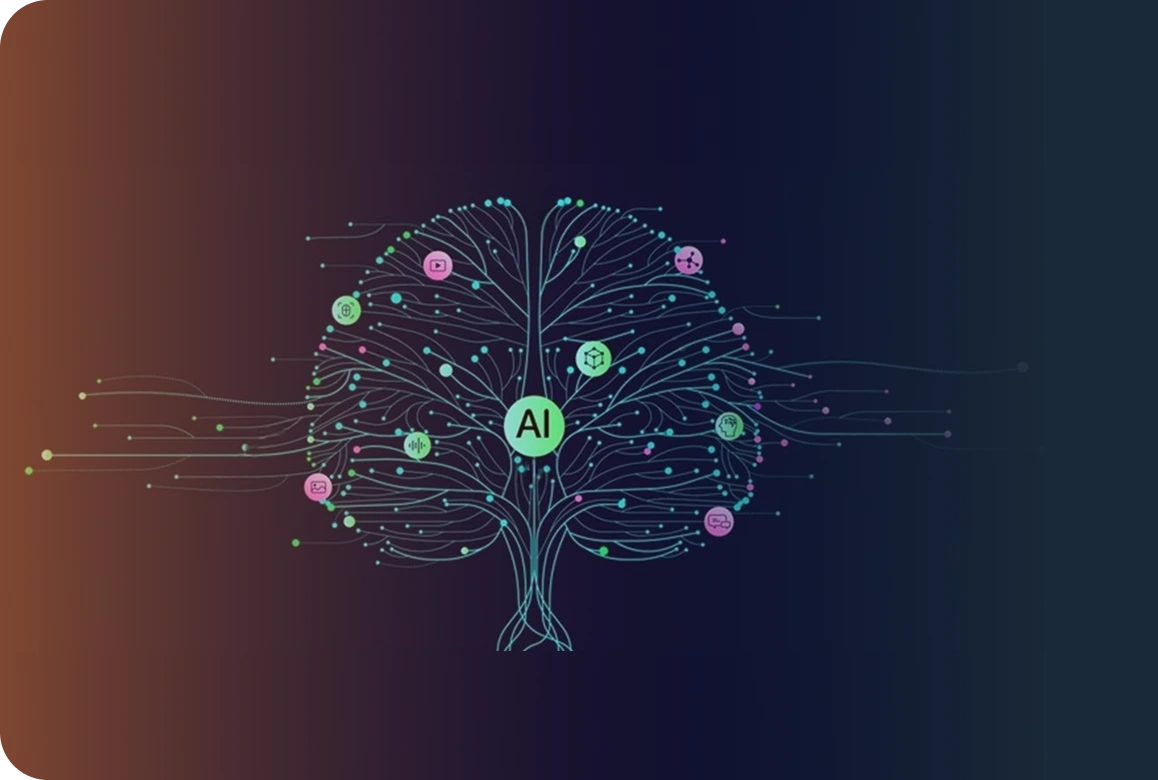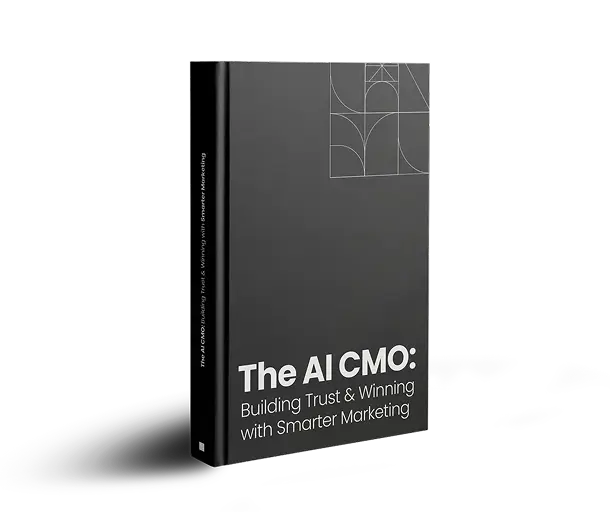
Highlights
- AI will move marketers beyond generic retargeting to deliver hyper-relevant, behavior-based messaging.
- Despite AI’s automation capabilities, human creativity, empathy, and judgment will still remain irreplaceable.
- As AI-generated content becomes mainstream, brands will stand out through originality and unique perspectives.
- AI will empower lean marketing teams to do more with less, shifting focus from execution to creativity and brand differentiation.
Introduction
AI is transforming B2B marketing at a pace we have never seen before. What used to be experimental is now becoming a necessary part of everyday marketing. From automating routine tasks to identifying buyer intent and delivering more personalized experiences, AI is playing an increasingly important role in B2B marketing.
AI is growing faster than we expected, and it has raised an important question: how will it reshape the core of B2B marketing by the end of 2026?
This transition concerns the way in which marketers make adjustments, how they keep human touch intact and still adapt to automation, and how they will create personalized experiences without blurring the identity of that brand. Companies will have to change their thinking about what actually leads the growth in this market as AI will play an increasing role in marketing operations.
To understand this better, we asked 12 B2B marketing experts and business leaders one key question: What do you think will be the biggest way AI will change B2B marketing and lead generation by the end of 2026?
Their responses offer thoughtful and practical insights into how AI is changing marketing’s future.
Here’s Our Expert Panel
- Aitana Arias
- Stijn Hendrikse
- Katherine Hunter-Blyden
- Michelle Curtis
- Sumantra Mukherjee
- Christina Kyriazi
- Nick Strada
- Phillip Scott Mandel
- Binyamin Rutstein
- Linda Pophal
- Brittany Rycroft
- Cami Bartel
#1 Aitana Arias

From someone working closely with B2B startups and scaleups, I see that the biggest shift AI will bring to B2B marketing and lead generation by the end of 2026 is the ability to finally market with precision and humanity at scale. What I usually observe when working hand in hand with founders and teams for early-stage companies is that they often juggle big ambitions with lean resources. AI is already helping level the playing and execution field, a.k.a automating repetitive tasks. But what I think is coming next is deeper and much needed. AI will help understand not just who to reach or what optimized message to send to them, but when, how, and why with messaging that adapts in real time to what a buyer actually cares about and the intent at that precise moment. This will allow marketers to spend less time guessing and more time building relationships (which is what truly matters and what really builds a business, right?).
Author Bio
Aitana Arias is a Fractional CMO with over 13 years of experience in B2B growth marketing for the tech and SaaS industries. You can connect with Aitana on LinkedIn.
#2 Stijn Hendrikse

By 2026, AI won’t be the differentiator, signal will. In a world where everyone uses the same tools, the winners in B2B marketing will be those who feed AI engines with the most original, high-fidelity human input. As content generation becomes commoditized, the value shifts to net-new insights, grounded in real experience. Companies that master the human-AI signal cycle by injecting fresh perspective into AI workflows will build marketing engines that outlearn and outperform. This is a winner-take-most moment. Noise is cheap. Signals are rare. And by 2026, the most signal-rich brands will dominate every channel they touch.
Author Bio
Stijn Hendrikse, author of T2D3: How Some Software Startups Scale, Where Many Fail, is a seasoned B2B SaaS leader with over 20 years of experience as CMO, CEO, and GTM advisor. From launching Office 365 at Microsoft to scaling growth-stage SaaS startups like MightyCall and Acumatica, Stijn has been in the trenches of what it really takes to grow. You can connect with Stijn and follow their work on LinkedIn.
#3 Katherine Hunter-Blyden

The best way AI will reshape B2B marketing and lead generation is through agentic AI. Agentic AI will make everything more efficient, from ideation to execution. These tools will allow marketers to increase output and, ultimately, require smaller marketing teams. They will also shift the skills required within marketing departments. As tasks become more automated, ideation and content production get faster. However, speed will not be the differentiator, because this efficiency comes at a cost. LLMs regurgitate existing content, pushing messaging toward the average. As a result, brands suffer due to a lack of differentiation. In other words, LLMs drive us all toward the same “answer”, but the brand is about standing apart from the crowd. Businesses will need marketers who can leverage AI while inserting their own creative intuition. Those who understand how to use AI tools to enhance brand differentiation will lead. The future belongs to marketers who pair human insight with machine efficiency. These folks will create differentiated messages that stand out, while others move toward the middle. Organizations will need to invest in tools and talent that support this new model of work.
Author Bio
Katherine Hunter-Blyden is a CMO Partner at TechCXO. She is a senior marketing executive with P&L management experience. As a full-stack marketer, Katherine’s experience includes brand strategy, advertising, digital marketing, sales promotion, product management, pricing and market research. Katherine helps businesses meet their goals with data-driven, quantifiable results. For more insights from Katherine, visit their LinkedIn profile.
#4 Michelle Curtis

AI is going to change a lot about B2B marketing next year, especially when it comes to how we analyze buyer behavior and automate outreach. But I don’t believe it will ever replace the human instinct it takes to truly connect, human to human. It can analyze data and predict actions, but it can’t “read the room” so to speak. It can’t pick up on hesitation in someone’s voice or feel the tension in a buying committee. That takes a person to do that. I think the real shift will be in what sellers are expected to be great at. Not scheduling emails or building sequences, because that’ll all be handled by AI eventually. Instead, we’ll see a bigger emphasis on soft skills like listening, reading emotion, and building trust. That is where it will be a human’s responsibility to actually drive deals forward, especially when the stakes are high or the path isn’t clear. If anything, AI will free sellers up to lean more into those human moments.
Author Bio
I received my degree in psychology and spent 13+ years working in enablement and revenue strategy — building programs that helped sellers move faster, talk smarter, and actually want to adopt change. My focus is on the human side of growth. Network with Michelle here: LinkedIn.
#5 Sumantra Mukherjee

By the end of 2026, AI won’t just help us find more leads — it will change how we think about lead generation altogether. Right now, most lead gen still runs on forms, cold outreach, and gated content. It’s transactional. We are still relying on the spray & pray model and hoping for something valuable lands. But AI is pushing us toward a smarter model — one that’s more predictive, personalized, and permission-based. We’ll know who’s in-market before they fill out a form. We’ll engage buyers based on real intent signals, not just demographics. And instead of pushing leads into funnels, we’ll build dynamic, self-optimizing journeys that adapt to where the buyer actually is. That means less noise, fewer “lead dumps,” and more qualified conversations. But here’s the catch: AI can only do this well if we stop treating it like a shortcut. It’s not about doing lazy marketing faster. It’s about designing thoughtful experiences — and letting AI help scale them with relevance, not repetition. The lead gen model of the future? Not more leads. Just the right ones — earlier, and with better context. Or I can say, AI will help effectiveness at scale.
Author Bio
Sumantra Mukherjee is a Head of Marketing at Datamatics Business Solutions specializing in driving B2B growth through AI-led go-to-market strategies, demand generation, and data strategy. Reach out to Sumantra directly on
LinkedIn.
#6 Christina Kyriazi

Soon, marketers will expand their use of AI beyond content creation. They’ll use AI to instantly identify which content is resonating, personalize it by audience segment, and deliver it across the right channels without much manual effort. One tool that’s bringing this use case to life is digital asset management platforms (DAMs) – they’re evolving from storage tools to intelligent systems that drive pipeline, helping marketing and lead gen teams accelerate scale and growth.
Author Bio
Christina is the Senior Vice President of Marketing at PhotoShelter, the leading digital asset management solution that helps you organize, manage, distribute, instantly share, and collaborate with your team on digital content. With a background in analytics and customer insights, she brings a data-driven, customer-first approach to B2B SaaS marketing. Christina’s leadership has helped position PhotoShelter as a go-to solution for marketers and organizations needing a trusted digital asset manager to scale content creation. Engage with Christina] directly on LinkedIn.
#7 Nick Strada

By the end of 2026, AI will not just accelerate B2B lead gen. It will erase the value of speed as a competitive edge. As the marginal cost of content creation asymptotically approaches zero, everyone will have fast content. Everyone will have scalable outreach. What AI will expose is the difference between noise and signal. If your brand is generic, forgettable, or hollow, it will disappear. The real differentiator will be meaning. Specificity. A point of view. Growth will not reward volume. It will reward meaning. The winners will be the ones who use AI to scale insight, not output and show up with something worth reading, not just something to say.
Author Bio
Nick Strada is the Founder & Creative Director at Bruiser, an independent brand and creative consultancy. Discover more from Nick by connecting on LinkedIn.
#8 Phillip Scott Mandel

AI already is having a tremendous impact in our industry, and will continue to do so—perhaps at an even more exponential rate. It affects content generation, customer journey mapping, and sales—especially in lead scoring and lead gen. However, if I had to pick one specific area where AI will have the most impact, I would say it would be in the field of autonomous campaign execution, specifically with AI agents. I imagine that by 2026, AI agents will be able to ideate, A/B test, and optimize multichannel campaigns without human input (or with some human oversight), and learn from performance data in real time. This will reduce time-to-market for marketing campaigns across the board, and lower the cost per acquisition for companies that choose to use this tactic.
Author Bio
Phillip Scott Mandel is the CEO of Mandel Marketing and the founder and managing editor of Abandon Journal, a literary magazine dedicated to “writing with abandon.” He is the author of An MFA For Your MBA: Professional-Level Writing Advice For Mastering Communication and Creativity in Business and in Your Career (2024). He lives in Austin, TX. You can connect with Phillip on LinkedIn.
#9 Binyamin Rutstein

Significantly more intricate and nuanced personalization of marketing efforts – this may be the biggest shift yet. The ability to tailor LLMs to a company’s specific needs and train them on the prospects’ data, history, pain points, this in itself is a major leap forward. It’s been years in the making, like B2C AI has, but I have a feeling we’re going to see it positively explode by the end of ’26. With B2B marketing, it’s about providing value, establishing trust, and being a professional. With a more personal approach powered by AI, companies may just ditch canned responses for more unique engagements.
Author Bio
I’m Binyamin Rutstein, CEO and founder of NextSelf, and a serial entrepreneur who has scaled multiple 7- and 8-figure companies. After facing emotional burnout firsthand, I now help high-performing leaders build trauma-informed resilience, emotional clarity, and sustainable success through self-awareness and nervous system education. Thank you for your consideration—I’d be happy to answer any follow-up you may have. Engage with Binyamin directly on LinkedIn.
#10 Linda Pophal

However, I think the biggest way AI will reshape B2B marketing and lead generation by the end of 2026 is the identification and deployment of ways that B2B marketers can ensure the quality, accuracy, and integrity of the content that is produced.
What I’ve observed with these tools is that their accuracy and reliability seem to erode over time – I’m not sure why. I’ve navigated from one tool to the next as I find reliability to wane. Claude has been pretty reliable until recently – I recently wrote a blog post on an experience that was very low quality.
A general concern about these public tools that I have is that I’ve seen a statistic indicating that about 57% of the content that can be found online has been AI-generated. If that is the content that these tools are being trained on, over time, the quality will further erode, I believe.
There is definitely a place for these tools and I believe 2026 will be a time of experimentation and learning how humans can best use them and best ensure their accuracy to protect the companies and brands they represent.
Author Bio
Linda Pophal, MA, PCM, SPHR, SHRM-SCP is the founder and owner of Strategic Communications, LLC, and a marketing and communication strategist with expertise in AI-optimized content marketing, HR and employee relations, strategic planning, B2B content marketing, PR/media relations and social media. She specializes in creating content that performs across both traditional search engines and emerging AI discovery platforms, helping B2B organizations get found by both Google searches and generative AI tools like ChatGPT and Claude. Connect with Linda on LinkedIn.
#11 Brittany Rycroft

The single biggest influence AI will have on B2B marketing and lead generation is shifting the focus from regurgitating content to becoming first-party researchers. As an example, AI is not capable of opinion-based user testing of a product or service. It can summarize what humans have written about a personal experience, but at present, it can’t have them for itself. Marketers will still need to generate the experiences and content that AI can then analyze or build comparisons for—but we’re going to need to give it something to draw from. This means marketers need to find topics and areas that AI hasn’t covered yet. If you can find the answer to a question using ChatGPT or Perplexity, so can your prospects. The trick is to become the first-party data source that people are drawn to (and AI learns from / references) to build authority, trust, and clicks.
Author Bio
Brittany Rycroft is a seasoned marketing leader with a deep focus on brand and content. Known for adapting quickly to industry shifts, she brings a systems-thinking approach to building strategies that connect, convert, and grow. She’s led marketing efforts across SaaS, ecommerce, and tech, always with an eye on what’s next. You can reach out to Brittany on LinkedIn.
#12 Cami Bartel

Aside from making marketing operations more efficient and allowing teams to do more with less budget, the way I see AI reshaping B2B marketing is the shift from traditional SEO to GEO (generative engine optimization). We’re starting to see the effects of this: companies that once ruled at the top of the Google page are struggling to be discovered on Chat GPT. In my opinion, AI is another channel tactic that is still rooted in marketing theory. According to 6Sense, the vast majority of B2B buyers go into buying cycles with a short list of brands to consider. That means if you’re not one of the brands they’re aware of BEFORE the sales cycle, you’re not likely to be considered at that stage. Being discoverable is one of the most important things for lead generation and AI is changing how brands are being discovered.
Author Bio
Cami Bartel is the Head of Revenue Marketing at ServiceMinder, with over 8 years of experience in B2B marketing, focusing on content marketing, demand generation, and public relations. Engage with Cami directly on
LinkedIn.
Conclusion
One can vividly see through these expert opinions that AI is not going to only transform the way we market in B2B but also transform what success is. Marketers that understand how to combine the power of intelligent automation with the power of human understanding and use AI not as a shortcut but as a strategic ally will dominate this new era.
By the end of 2026, the most successful brands will likely be those that prioritize relevance over reach, quality over volume, and trust over tactics. As we continue to explore and experiment with these technologies, one thing is certain: the role of marketers is evolving, and those who stay curious, adaptable, and thoughtful will be best positioned to lead.
Our blog
Latest blog posts
Tool and strategies modern teams need to help their companies grow.

Interactive B2B content is reshaping the B2B sales landscape by accelerating sales en...

Not every social media platform is worth your time or budget when it comes to social ...

Many B2B marketers are increasing ad budgets but seeing little impact on pipeline or ...




